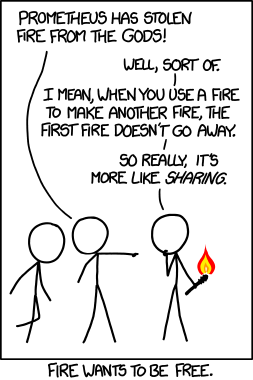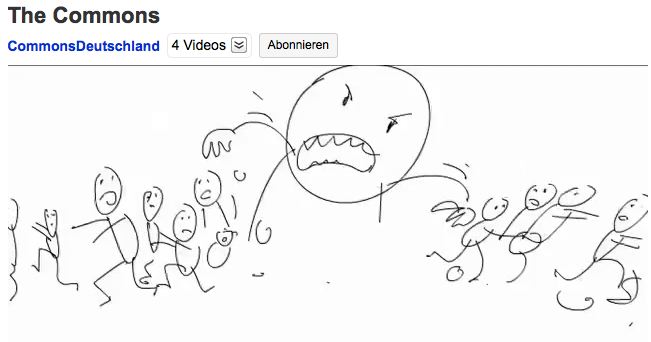Prometheus liked sharing


 Stefan Merten reported to oekonux mailinglist from “Com’on!”:
Stefan Merten reported to oekonux mailinglist from “Com’on!”:
“Last Saturday I attended the workshop “COM’ ON! – Die alte Eigentumswelt dreht sich”.
The workshop has been organized by the Rosa-Luxemburg-Stiftung which
is the foundation of the party “Die Linke” in Germany. “Die Linke” is
the socialist party in Germany. As far as I understood the Keimform
people co-organized this event.Read more | ›››
When community garden activists of the 1970s and early 1980s clandestinely planted tomatoes, cucumber and sunflowers in abandoned backyards and on run-down lots, they probably never imagined that a time would come when city administrations would embrace urban gardening as an important “cultural, ecological and social resource”.1 Many of today’s community gardens in North America and Europe started out as squats or informal “guerilla style” gardens and were influenced by, if not a substantial part of urban social and environmental movements of the 1960s and 1970s.2
Read more | ›››
 During the ‘Golden Age’ of piracy in the 17th and 18th centuries, crews of early proletarian rebels, dropouts from civilization, plundered the lucrative shipping lanes between Europe and America. They operated from land enclaves, free ports; ‘pirate utopias’ located on islands and coastlines as yet beyond the reach of civilization. From these mini-anarchies – ‘temporary autonomous zones’ – they launched raiding parties so successful that they created an imperial crisis, attacking British trade with the colonies, and crippling the emerging system of global exploitation, slavery and colonialism. Read more about “Pirate Utopias: Under the Banner of King Death”.
During the ‘Golden Age’ of piracy in the 17th and 18th centuries, crews of early proletarian rebels, dropouts from civilization, plundered the lucrative shipping lanes between Europe and America. They operated from land enclaves, free ports; ‘pirate utopias’ located on islands and coastlines as yet beyond the reach of civilization. From these mini-anarchies – ‘temporary autonomous zones’ – they launched raiding parties so successful that they created an imperial crisis, attacking British trade with the colonies, and crippling the emerging system of global exploitation, slavery and colonialism. Read more about “Pirate Utopias: Under the Banner of King Death”.
 A new NGO called A Human Right is campaigning “Buy this Satellite” to raise $150K in a bid to buy one of the world’s highest capacity communications satellites from its bankrupt owners in order to re-task it to supply Internet access to the world’s poorest people. They plan on building their own super-cheap satellite modems as well. Read more
A new NGO called A Human Right is campaigning “Buy this Satellite” to raise $150K in a bid to buy one of the world’s highest capacity communications satellites from its bankrupt owners in order to re-task it to supply Internet access to the world’s poorest people. They plan on building their own super-cheap satellite modems as well. Read more
IASC2011, the 13th (!) Biennial Conference of the International Association for Study of the Commons, taking place on january 10th to 14th in Hyderabad, India, will take a critical look at the interface between human and natural systems, Commons in particular, to build on our understanding on the elements and interconnectedness that sustain life, collective action and our future. The Conference will contribute rich lessons and principles for managing local, complex, as well as Global Commons such as international arrangements to respond to climate change. Read more
 The animated video clip titled “The Commons” provides a short introduction into the idea of the commons, as well as a critical review of the so called “tragedy of the commons”.
The animated video clip titled “The Commons” provides a short introduction into the idea of the commons, as well as a critical review of the so called “tragedy of the commons”.
 The International Commons Conference connected about 150 leading figures in commons-based studies and activism for a multidisciplinary, international conference in Berlin, Heinrich Böll Foundation. The general objective was to emerge with a set of principles and long-term goals that can foster the planning and development of commons based organisations and policy as well as their networking capacity. Read more about the outcomes of the conference.
The International Commons Conference connected about 150 leading figures in commons-based studies and activism for a multidisciplinary, international conference in Berlin, Heinrich Böll Foundation. The general objective was to emerge with a set of principles and long-term goals that can foster the planning and development of commons based organisations and policy as well as their networking capacity. Read more about the outcomes of the conference.
See also: Workshop report: Commoning through the Crisis: creating commons power and resisting enclosures and cooptation
 Online file sharing too dangerous? Dead Drops is an anonymous, offline, peer to peer file-sharing network in public space. Anyone can access a Dead Drop and everyone may install a Dead Drop in their neighborhood/city. A Dead Drop must be public accessible. Read more or check the dead drop database
Online file sharing too dangerous? Dead Drops is an anonymous, offline, peer to peer file-sharing network in public space. Anyone can access a Dead Drop and everyone may install a Dead Drop in their neighborhood/city. A Dead Drop must be public accessible. Read more or check the dead drop database
 In the film series, “Another World is Plantable!”, community gardens in different parts of the world are presented. At the core of the film series are the activists from the community gardens, the gardens themselves, and the visions the activists have of them. They recount how and why their gardens are not just green oases in the middle of the city, but much more than that projects that bring into being ‘another world’. The documentary film series takes up these ideas and connects them to emancipatory projects in different parts of the world.
In the film series, “Another World is Plantable!”, community gardens in different parts of the world are presented. At the core of the film series are the activists from the community gardens, the gardens themselves, and the visions the activists have of them. They recount how and why their gardens are not just green oases in the middle of the city, but much more than that projects that bring into being ‘another world’. The documentary film series takes up these ideas and connects them to emancipatory projects in different parts of the world.
 The Document Foundation released the beta of LibreOffice, to speed up the rate of changes to the notoriously slow OpenOffice office suite software project under the lead of the software corporation Oracle. This suggestion received support from all the major open-source and Linux powers: Red Hat, Novell, and Ubuntu. Even Canonical, the company behind Ubuntu, announced that they’d place LibreOffice in next spring’s update of Ubuntu. Only Oracle does not like the fork and insists of keeping the name OpenOffice for its own free office suit. Read more
The Document Foundation released the beta of LibreOffice, to speed up the rate of changes to the notoriously slow OpenOffice office suite software project under the lead of the software corporation Oracle. This suggestion received support from all the major open-source and Linux powers: Red Hat, Novell, and Ubuntu. Even Canonical, the company behind Ubuntu, announced that they’d place LibreOffice in next spring’s update of Ubuntu. Only Oracle does not like the fork and insists of keeping the name OpenOffice for its own free office suit. Read more
In the subway, there’s no longer any trace of the screen of embarrassment that normally impedes the gestures of the passengers. Strangers make conversation without making passes. A band of comrades conferring on a street corner. Much larger assemblies on the boulevards, absorbed in discussions. Surprise attacks mounted in city after city, day after day. A new military barracks has been sacked and burned to the ground. The evicted residents of a building have stopped negotiating with the mayor’s office; they settle in. A company manager is inspired to blow away a handful of his colleagues in the middle of a meeting. There’s been a leak of files containing the personal addresses of all the cops, together with those of prison officials, causing an unprecedented wave of sudden relocations. We carry our surplus goods into the old village bar and grocery store, and take what we lack. Some of us stay long enough to discuss the general situation and figure out the hardware we need for the machine shop. The radio keeps the insurgents informed of the retreat of the government forces. A rocket has just breached a wall of the Clairvaux prison. Impossible to say if it has been months or years since the “events” began. And the prime minister seems very alone in his appeals for calm. Read more
Read more | ›››
 A company full of crazy people? A Group of nutters? If you think that Semco is something along these lines, you’re not entirely wrong. However, it is not by chance that unconventional ideas are created at this company. They are created and managed within an open management model, different from conventional models and this is exactly what we want. You can now find out more about the Semco Way.
A company full of crazy people? A Group of nutters? If you think that Semco is something along these lines, you’re not entirely wrong. However, it is not by chance that unconventional ideas are created at this company. They are created and managed within an open management model, different from conventional models and this is exactly what we want. You can now find out more about the Semco Way.
According to the capitalist lexicon, the “Free Market” is the economic system in which prices are determined by unrestricted competition between privately owned businesses. Any sensible person can recognize immediately that neither human beings nor resources are free in such a system; hence, a “Really Really Free Market” is a market that operates according to gift economics, in which nothing is for sale and the only rule is share and share alike. In the interest of not taxing the reader’s patience, a single apostrophe stands in for the two “Really”s throughout this text. Read more